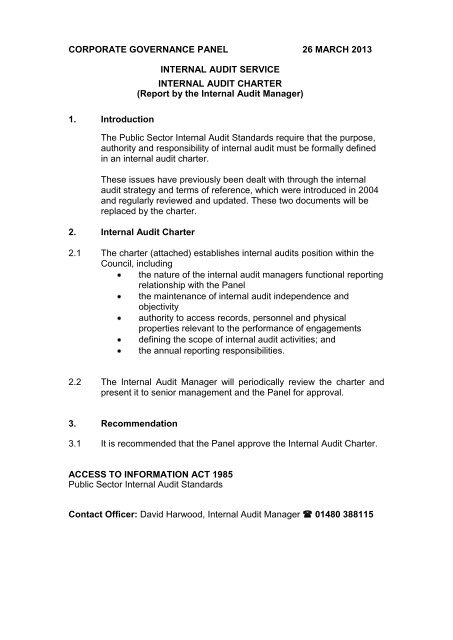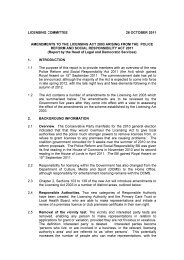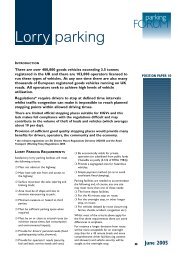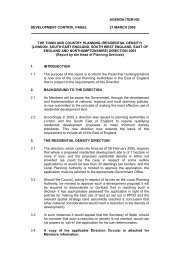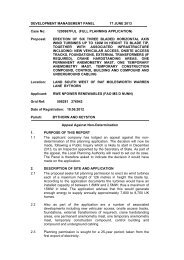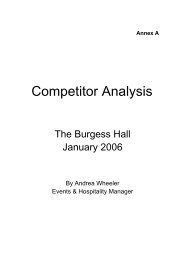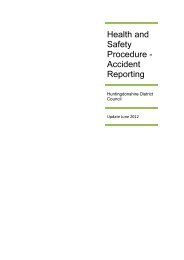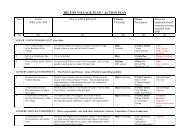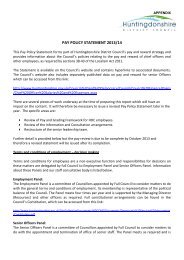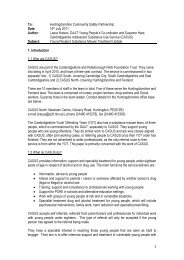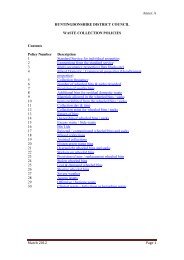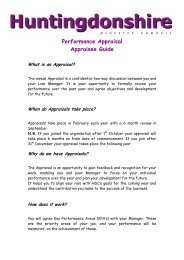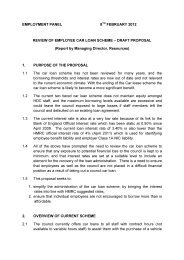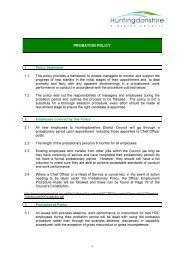Internal Audit Service: Internal Audit Charter PDF 112 KB
Internal Audit Service: Internal Audit Charter PDF 112 KB
Internal Audit Service: Internal Audit Charter PDF 112 KB
You also want an ePaper? Increase the reach of your titles
YUMPU automatically turns print PDFs into web optimized ePapers that Google loves.
CORPORATE GOVERNANCE PANEL 26 MARCH 2013<br />
INTERNAL AUDIT SERVICE<br />
INTERNAL AUDIT CHARTER<br />
(Report by the <strong>Internal</strong> <strong>Audit</strong> Manager)<br />
1. Introduction<br />
The Public Sector <strong>Internal</strong> <strong>Audit</strong> Standards require that the purpose,<br />
authority and responsibility of internal audit must be formally defined<br />
in an internal audit charter.<br />
These issues have previously been dealt with through the internal<br />
audit strategy and terms of reference, which were introduced in 2004<br />
and regularly reviewed and updated. These two documents will be<br />
replaced by the charter.<br />
2. <strong>Internal</strong> <strong>Audit</strong> <strong>Charter</strong><br />
2.1 The charter (attached) establishes internal audits position within the<br />
Council, including<br />
the nature of the internal audit managers functional reporting<br />
relationship with the Panel<br />
the maintenance of internal audit independence and<br />
objectivity<br />
authority to access records, personnel and physical<br />
properties relevant to the performance of engagements<br />
defining the scope of internal audit activities; and<br />
the annual reporting responsibilities.<br />
2.2 The <strong>Internal</strong> <strong>Audit</strong> Manager will periodically review the charter and<br />
present it to senior management and the Panel for approval.<br />
3. Recommendation<br />
3.1 It is recommended that the Panel approve the <strong>Internal</strong> <strong>Audit</strong> <strong>Charter</strong>.<br />
ACCESS TO INFORMATION ACT 1985<br />
Public Sector <strong>Internal</strong> <strong>Audit</strong> Standards<br />
Contact Officer: David Harwood, <strong>Internal</strong> <strong>Audit</strong> Manager 01480 388115
<strong>Internal</strong> <strong>Audit</strong> <strong>Charter</strong>
INTERNAL AUDIT CHARTER Effective April 2013<br />
The <strong>Internal</strong> <strong>Audit</strong> <strong>Service</strong> has been established by the Council as a key<br />
component of its governance framework. This <strong>Charter</strong> provides a framework for<br />
the conduct of <strong>Internal</strong> <strong>Audit</strong> in Huntingdonshire District Council and has been<br />
approved by the Council’s Corporate Governance Panel.<br />
The key provisions of this <strong>Charter</strong> are set out below.<br />
<strong>Internal</strong> <strong>Audit</strong> <strong>Service</strong><br />
The Council’s internal audit service is an independent, objective assurance and consulting<br />
activity designed to add value and improve the Council’s operations. It helps the Council<br />
accomplish its objectives by bringing a systematic, disciplined approach to evaluate and<br />
improve the effectiveness of risk management, control and governance processes.<br />
Independence & Objectivity<br />
The internal audit service will remain free from interference by any element in the Council and<br />
its scope shall not be restricted in anyway. It shall be free to review the arrangements of any<br />
aspect of service delivery, finance or governance irrespective of whether those arrangements<br />
are provided directly or indirectly (via partnerships, contractually or any other business<br />
arrangement).<br />
The objectivity, impartiality, integrity and conduct of all <strong>Internal</strong> <strong>Audit</strong> staff must be above<br />
reproach at all times.<br />
Authority<br />
<strong>Internal</strong> auditors are authorised to have full, free and unrestricted access to all services and<br />
functions, premises, assets, employees, elected members, suppliers and contractors, records<br />
and other documentation and information that the <strong>Internal</strong> <strong>Audit</strong> Manager considers necessary<br />
to enable the <strong>Internal</strong> <strong>Audit</strong> <strong>Service</strong> to meet its responsibilities. All employees are required to<br />
assist the internal audit activity in fulfilling its roles and responsibilities.<br />
Confidentiality<br />
All records, documentation and information accessed in the course of undertaking internal<br />
audit activities shall be used solely for the conduct of internal audit activities. The <strong>Internal</strong><br />
<strong>Audit</strong> Manager and individual audit staff (including contractors and external service providers<br />
performing work on behalf of internal audit) are responsible and accountable for maintaining<br />
the confidentially of the information they receive during the course of their work.<br />
Reporting<br />
The <strong>Internal</strong> <strong>Audit</strong> Manager shall submit to the Corporate Governance Panel, no later than the<br />
date at which the Council’s annual governance statement is approved, an annual report and<br />
formal audit opinion.
Purpose of <strong>Internal</strong> <strong>Audit</strong><br />
The internal audit service has been established to:<br />
provide independent, objective assurance to the Council on its operations<br />
add value, by assisting management improve the delivery of the Council’s<br />
objectives and operations through evaluating and challenging the effectiveness of<br />
risk management, control and governance processes.<br />
Professionalism<br />
The internal audit service will govern itself by adhering to the Public Sector <strong>Internal</strong><br />
<strong>Audit</strong> Standards (PSIAS) 1 .<br />
Supplementary guidance issued and endorsed by the Relevant <strong>Internal</strong> <strong>Audit</strong> Standard<br />
Setters as applying to local government will also be adhered to along with the Council’s<br />
relevant policies and procedures and the internal audit manual.<br />
Non conformance with the PSIAS shall be reported to senior management and the<br />
Corporate Governance Panel.<br />
Relationship with Members & Senior Management<br />
Corporate Governance Panel<br />
The Accounts & <strong>Audit</strong> (England) Regulations 2011 require the Council to “undertake an<br />
adequate and effective internal audit of its accounting records and of its system of<br />
internal control in accordance with proper practices”.<br />
Proper practice is contained within the PSIAS.<br />
The Council has established a Corporate Governance Panel 2 (Panel) and specifically<br />
delegated to it responsibility for ‘ensuring there are effective arrangements for the system<br />
of internal audit of the Council.” The internal audit service shall report functionally to the<br />
Panel.<br />
The <strong>Internal</strong> <strong>Audit</strong> Manager shall have:<br />
free and unrestricted access to the Panel and attend all of its meetings<br />
the right to meet with the Chairman of the Corporate Governance Panel and/or the<br />
relevant Portfolio Holder to discuss any matters or concerns that have arisen from<br />
internal audit work.<br />
1 The PSIAS are based upon The Institute of <strong>Internal</strong> <strong>Audit</strong>ors' mandatory guidance including the Definition of<br />
<strong>Internal</strong> <strong>Audit</strong>ing, the Code of Ethics, and the International Standards for the Professional Practice of <strong>Internal</strong><br />
<strong>Audit</strong>ing.<br />
2 The Corporate Governance Panel shall fulfil the role of the Board as determined by the Public Sector <strong>Internal</strong><br />
<strong>Audit</strong> Standards.
Senior Management<br />
The Managing Director and the Assistant Director - Finance & Resources 3 and Assistant<br />
Director - Environment, Growth & Planning shall fulfil the role of senior management, as<br />
defined by the PSIAS.<br />
The Assistant Director Finance & Resources shall support the Panel by ensuring that<br />
there are effective arrangements 4 for the internal audit of the control environment.<br />
The <strong>Internal</strong> <strong>Audit</strong> Manager shall<br />
report administratively to the Assistant Director - Finance & Resources;<br />
have free and unrestricted access to senior management.<br />
Independence & Objectivity<br />
Independence is essential to the effectiveness of the internal audit service; so it will<br />
remain free from interference in all regards. This shall include, but not be limited to<br />
matters of audit selection, scope, procedure, frequency, timing or report content.<br />
<strong>Internal</strong> auditors must exhibit the highest level of professional objectivity in gathering,<br />
evaluating, and communicating information about the activity or process being examined.<br />
They must make a balanced assessment of all the relevant circumstances and not be<br />
unduly influenced by their own interests or by others in forming judgments.<br />
The <strong>Internal</strong> <strong>Audit</strong> Manager will confirm to the Corporate Governance Panel, at least<br />
annually, the organisational independence of the internal audit service.<br />
The <strong>Internal</strong> <strong>Audit</strong> Manager is responsible for the delivery of the <strong>Internal</strong> <strong>Audit</strong>, Insurance<br />
and Risk Management services. All three areas have a key part to play in mitigating the<br />
risks facing the Council. Responsibility for these operational areas is recognised by<br />
senior management and the Panel.<br />
With the exception of insurance and risk management, internal audit staff will not<br />
implement internal controls, develop procedures, install systems, prepare records, or<br />
engage in any other activity that may impair their judgment.<br />
Authority & Confidentiality<br />
<strong>Internal</strong> auditors shall have full, free and unrestricted access to all services and functions,<br />
premises, assets, employees, elected members, suppliers and contractors, records and<br />
other documentation and information that the <strong>Internal</strong> <strong>Audit</strong> Manager considers<br />
necessary to enable the <strong>Internal</strong> <strong>Audit</strong> <strong>Service</strong> to meet its responsibilities. All employees<br />
are required to assist the internal audit activity in fulfilling its roles and responsibilities.<br />
All records, documentation and information accessed in the course of undertaking<br />
internal audit activities shall be used solely for that purpose. The <strong>Internal</strong> <strong>Audit</strong> Manager<br />
and individual audit staff (including contractors and external service providers performing<br />
3 Fulfilling the duties of Section 151 of the 1972 Local Government Act<br />
4 As outlined in the Cipfa publication “The Role of the CFO in public sector organisations”.
work on behalf of internal audit) are responsible and accountable for maintaining the<br />
confidentially of the information they receive during the course of their work.<br />
<strong>Internal</strong> <strong>Audit</strong> Management<br />
The Council shall appoint an <strong>Internal</strong> <strong>Audit</strong> Manager who shall determine the priorities of,<br />
effectively manage and deliver the internal audit service in accordance with this <strong>Charter</strong>.<br />
The <strong>Internal</strong> <strong>Audit</strong> Manager shall:<br />
ensure they have a comprehensive understanding of the Council’s systems,<br />
structures and operations so allowing the preparation of strategic and annual risk<br />
based audit plans that are closely aligned to the need to provide assurance<br />
against the Council’s business objectives as contained within its themes and<br />
aims, principal risks and framework of assurance.<br />
review and adjust the plans as necessary, in response to changes in the<br />
Council’s risks, operations, programs, systems and controls.<br />
report annually the impact and consequence of any resource limitations across<br />
the strategic plan period to the Panel, who will then recommend to Cabinet<br />
whether or not to accept the consequence identified or seek an increase in<br />
<strong>Internal</strong> <strong>Audit</strong>’s resources.<br />
Ensure that all audit work is completed to high standards and in accordance with<br />
the standards, practices and procedures as set out in the internal audit manual .<br />
undertake an annual review of the development and training needs of internal<br />
audit staff and arrange for appropriate training to be provided.<br />
put in place arrangements that ensure internal audit is notified of all suspected or<br />
detected instances of fraud, corruption or impropriety and in conjunction with the<br />
Corporate Fraud Manager:<br />
promote a counter-fraud culture within the Authority<br />
determine the most appropriate method of investigating allegations.<br />
establish effective relationships with managers at all levels.<br />
Role and responsibilities<br />
<strong>Internal</strong> audit reviews shall examine and evaluate the adequacy and effectiveness of the<br />
Council’s governance, risk management, and internal control processes. This shall be<br />
achieved via:<br />
Assurance activities: results of which will influence the opinion on the adequacy<br />
and effectiveness of the control environment.<br />
Risk based system audit reviews. The documentation, evaluation and<br />
testing of financial, operational and management information systems.<br />
Information technology reviews. Specialist evaluation of hardware,<br />
software and the IT environment.
Fundamental financial systems. Reviews focusing on agreed key<br />
controls.<br />
Performance improvement. The economy, efficiency and effectiveness<br />
of business systems and processes.<br />
Advisory activities: results of which will contribute to the opinion on the<br />
adequacy and effectiveness of the control environment.<br />
Reporting and Monitoring<br />
Systems & processes. Control advice on new and developing systems.<br />
Consulting services. Reviews at the request of management, that add<br />
value and improve governance, risk management and control processes<br />
and support management in their work.<br />
<strong>Internal</strong> <strong>Audit</strong> Reports<br />
At the conclusion of a review, a written report will be issued to the appropriate manager,<br />
that will<br />
include an overall assurance opinion, but not provide absolute assurance, on the<br />
adequacy of the governance, risk and control processes;<br />
identify inadequately addressed risks and non-effective control processes;<br />
detail management’s response and timescale for corrective action;<br />
identify issues of good practice<br />
When corrective action has not been agreed, reporting will be escalated to a level<br />
consistent with the <strong>Internal</strong> <strong>Audit</strong> Manager’s assessment of the risk.<br />
The <strong>Internal</strong> <strong>Audit</strong> Manager shall regularly review and report to senior management, the<br />
progress made by managers in introducing the agreed corrective actions. Senior<br />
Management shall ensure that agreed corrective actions are introduced.<br />
Reporting to the Panel<br />
The <strong>Internal</strong> <strong>Audit</strong> Manager shall present an annual and interim report to the Panel that<br />
meets the requirements of the PSIAS. The annual report shall be timed to support the<br />
Council’s Annual Statement of Assurance on Corporate Governance and include an<br />
opinion on the overall adequacy and effectiveness of the control environment.<br />
Quality and assurance programme<br />
An annual review of internal audit, sufficient to meet the requirements of the Account &<br />
<strong>Audit</strong> (England) Regulations 2011 shall be completed. The results shall be reported to<br />
senior management and the Panel.<br />
The <strong>Internal</strong> <strong>Audit</strong> Manager will arrange for an independent review of the efficiency and<br />
effectiveness of the internal audit service to be undertaken at least every five years.<br />
The results of the review will be reported to senior management and the Panel.
Improvement plans arising from any review of internal audit shall be prepared as<br />
appropriate, and reported to senior management and the Panel annually.<br />
Relationships with external audit and other assurance activities<br />
<strong>Internal</strong> <strong>Audit</strong> will establish and maintain an open relationship with the external auditor<br />
and any other assurance provider. <strong>Internal</strong> audit will plan its activity so that there is<br />
adequacy of audit coverage and to minimise duplication of assurance effort.<br />
External audit will have full and free access to all internal audit strategies, plans,<br />
working papers and reports.<br />
Review of the <strong>Charter</strong><br />
The <strong>Internal</strong> <strong>Audit</strong> Manager will review annually the <strong>Internal</strong> <strong>Audit</strong> <strong>Charter</strong> and report the<br />
outcome of that review to the Senior Management. Approval of the <strong>Charter</strong> shall be the<br />
responsibility of the Panel. This version was approved on the 26 March 2013.


